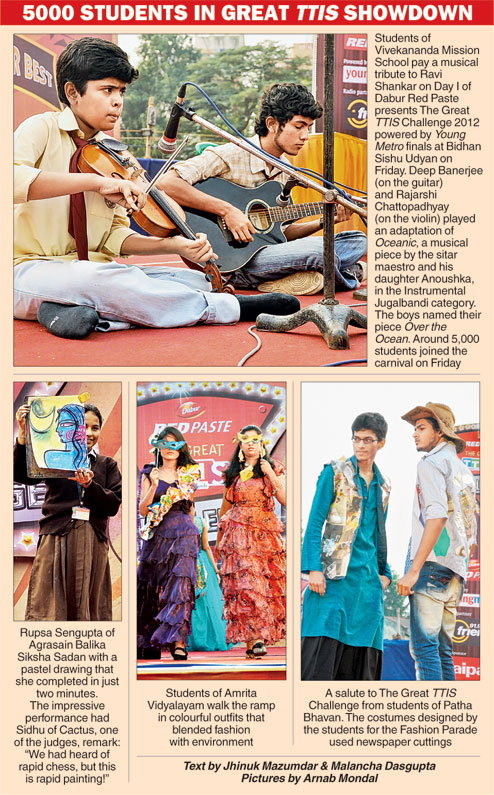 |
St. Xavier’s created debating history on Friday evening, defeating two of England’s oldest universities — Oxford and Cambridge — in a war of words that gave the visitors a taste of the argumentative Indian.
The Alsoc Challenge Debate, presented by the old boys’ association of St. Xavier’s Collegiate School and organised in association with The Telegraph, Calcutta Club and the Calcutta Debating Circle, had six teams of two members each from St. Xavier’s, Presidency University, Loreto College, Calcutta University, Oxford and Cambridge engage in a British parliamentary-style debate on the motion, “This house believes that social networking is a failure of communication”.
Neurosurgeon Sandip Chatterjee chaired the debate at the St. Xavier’s auditorium.
If Team Oxford’s Matt Handley, who spoke for the motion, and Emma Livingston, who spoke against it, wowed the packed auditorium at the Park Street address with their logical arguments, college student Aditya Vikram Doshi and Class XI boy Sourya Dasgupta of Team Xavier’s won over everyone with their wit.
According to Matt, one of the reasons why social networking is a failure of communication is that the user fails to express his or her true self. “People are too complicated to be explained through 140 characters,” he said, citing examples of sifting through pictures for the perfect display on Facebook, and the fact that communication on social media can be edited, robbing it of spontaneity.
Teammate Emma argued that social networking sites actually enhanced communication by opening more channels.
“When I want information on something I post on Facebook. I get comments, and if I find someone’s comments interesting I can take it further by talking about it over phone,” she said.
The problem, according to Xaverian Aditya Vikram, was not that people were communicating through social networking but that the young generation was learning to communicate through it, dispensing with the importance of body language in the art of communication.
“I would like to take you through the misinterpretation that social networking can often cause. For example, if you have left your caps lock on and keep typing, people automatically assume that you are angry and don’t realise that you might have accidentally left that on,” he said.
 |
Sourya, the youngest debater of the evening, sauntered to the podium and took his time in tearing to shreds the arguments of all the proponents of the motion who had spoken before him.
“Saying that social networking is bad because there is a lack of communication is like shooting the messenger,” argued the schoolboy, citing China’s crackdown on the Internet as an example of the power of communication through social networking websites.
“Governments are afraid as to what might happen if the websites are opened to the public as the totalitarian regime knows that they won’t be able to stay in power,” he said.
Point noted, motion defeated!
While the other teams — Satyaki Majumdar and Sohail Abdi of Presidency University, Samrita Ganguly and Adrija Chatterjee of Loreto College, Arghya Basu and Sreya Basu of Calcutta University and Richard Coates and Matt Hazell of the University of Cambridge — covered a range of topics from the Arab Spring to Darwin, there could be no argument about who deserved to win the evening.
Now if only we had a few Xaverians playing cricket for India against Alastair Cook’s men!











